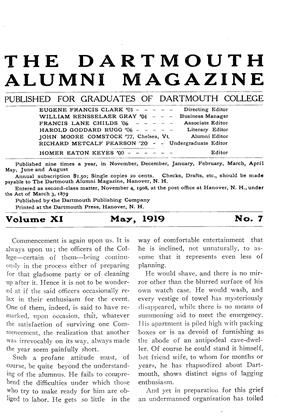upon us; the officers of the College—certain of them—being continuously in the process either of preparing for that gladsome party or of cleaning up after it. Hence it is not to be wondered at if the said officers occasionally relax in their enthusiasm for the event. One of them, indeed, is said to have remarked, upon occasion, that, whatever the satisfaction of surviving one Commencement, the realization that another was irrevocably on its way, always made the year seem painfully short.
Such a profane attitude must, of course, be quite beyond the understanding of the alumnus. He fails to comprehend the difficulties under which those who try to make ready for him are obliged to labor. He gets so little in the way of comfortable, entertainment that he is inclined, not unnaturally, to assume that it represents even less of planning.
He would shave, and there is no mirror other than the blurred surface of his own watch case. He would wash, and every vestige of towel has mysteriously disappeared, while there is no means of summoning aid to meet the emergency. His apartment is piled high with packing boxes or is as devoid of furnishing as the abode of an antipodeal cave-dweller. Of course he could stand it himself, bat friend wife, to whom for months or years, he has rhapsodized about Dartmouth, shows distinct signs of lagging enthusiasm.
And yet in preparation for this grief an undermanned organization has toiled night and day, knowing full well that its efforts will produce unsatisfactory results; but still toiling because the difference between the poor something offered and the nothing upon which it is based is the difference between Commencement and no Commencement.
Day after day, year after year, Miss Newell has sat at the library desk, giving thoughtful and cheerful aid to heedless student generations. For many of the faculty her sense of humor and fine appreciation have added zest to utilization of the library. With the endless annoyances of careless borrowers and crowded shelves she has contended patiently and wisely. In her years of service she has attained that knowledge of the library and of the ways of the College which only years can confer. She ceases her work regretfully while still giving of her best. The College accedes, respecting her decision, but with a very genuine sense of loss.
Dartmouth's new curriculum receives extended consideration elsewhere in this issue. It is fortunately not an eleventh hour contrivance thrown together to satisfy the world that the College is alive to what are vaguely referred to as the demands of a new era. Instead, it represents the outcome of faculty deliberations well under way before the full significance of the world war had become manifest, and before America's part in it had been surmised by any save a few of the most far-sighted.
The feature of the curriculum; likely most to impress the casual observer is the obvious intention of forcing upon the student mind some conception of the vast environment in which the human being moves and of developing some recognition of his relationship to even the outermost edge of it.
That is presumably one of the purposes of education, anyway;—perhaps its chief purpose. Still it is frequently enough obscured in the detail of specific courses whose functioning with anything in particular the pupil understands hazily if at all. Henceforth Dartmouth will take each of its youngsters firmly by the arm and lead him to a high place, whence, if his vision be not too dense, he can view the teeming world and the complex net work of its controls. If the sight fails to arouse him, nothing else than hard experience will; and the sooner he gets it, the better.
It is quite confidently stated by some that Dartmouth's new curriculum is the best yet produced by any of the colleges; and there is considerable satisfaction in the thought. Yet a curriculum is only a series of guide posts. It does not make the road nor supply the leadership that will conquer its difficulties. If the officers of Dartmouth—or the alumni - were to be content with the opportunity to point with pride to a perfect paper scheme, there would really be good cause for viewing the probable outcome with alarm.
In so far as the official college attitude is concerned, however, there is no ground for anything but optimism. Since the beginning of his administration, President Hopkins has been bending every energy to improving the status of the existing faculty and to strengthening it, wherever necessary, by the addition of well tested material. The dual process has involved considerable salary increases, which, at length, have brought Dartmouth's general scale of remuneration almost to a first class level; and with it a considerable lengthening in the faculty roll of men in the higher academic grades. Accompanying this has gone the clear enunciation of a policy of speeding individual advancement as opportunity affords rather than only as unavoidable necessity compels.
As a result will come next year an addition to the College budget of close to $60,000 for faculty salaries alone. As undergraduate numbers increase from the immediate estimate of 1200, the salary totals will automatically rise; for more instructors must then be added to the staff. At the same time, too, Dartmouth cannot long tolerate being almost on a first class level in its faculty remuneration; for, in the equalizations of time, that implies being almost first class in all respects.
The relationship of the alumni to this situation has already been pointed out. The plans now afoot can hardly be carried into effect without their aid, maintained steadfastly from year to year. It would seem fair to assume that every graduate of the College wishes to see Dartmouth in the front rank at all points and ready to bear some responsibility for putting it there.
 View Full Issue
View Full Issue















